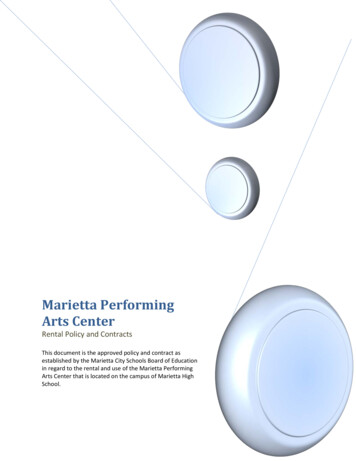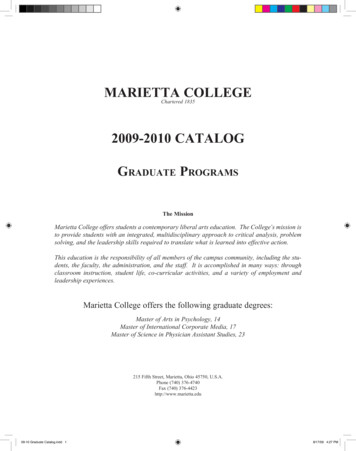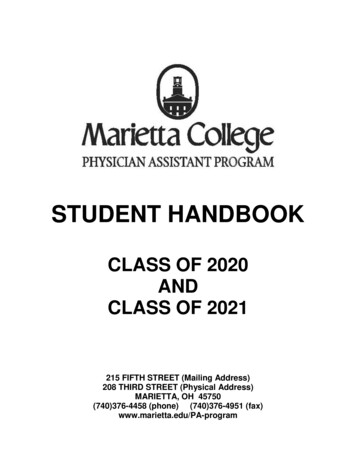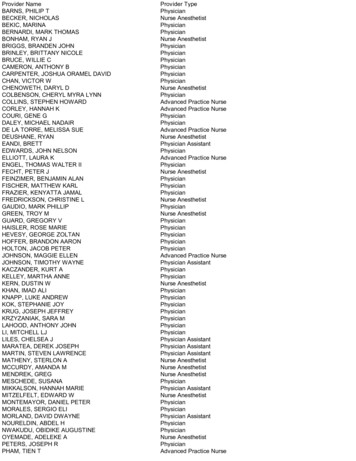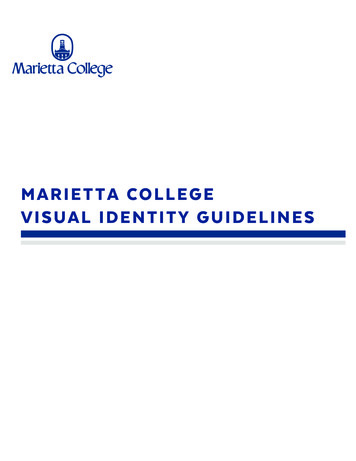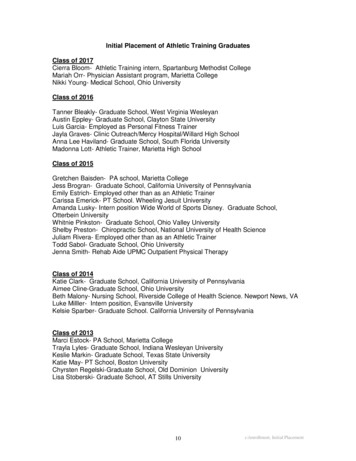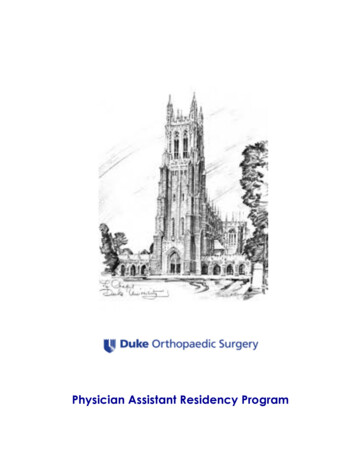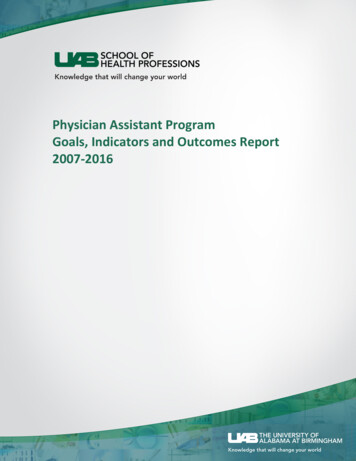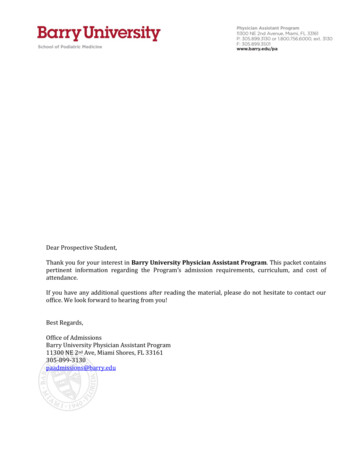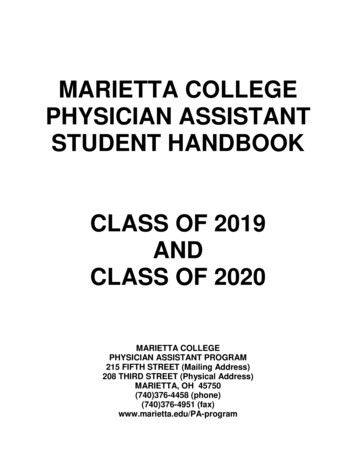
Transcription
MARIETTA COLLEGEPHYSICIAN ASSISTANTSTUDENT HANDBOOKCLASS OF 2019ANDCLASS OF 2020MARIETTA COLLEGEPHYSICIAN ASSISTANT PROGRAM215 FIFTH STREET (Mailing Address)208 THIRD STREET (Physical Address)MARIETTA, OH 45750(740)376-4458 (phone)(740)376-4951 (fax)www.marietta.edu/PA-program
MARIETTA COLLEGEPHYSICIAN ASSISTANT PROGRAMSTUDENT HANDBOOKThis Handbook is published by the Marietta College Physician Assistant Program and includesimportant requirements, policies, practices and procedures that will be applicable to all studentsthroughout the didactic (first 12 months) and clinical phase (second 14 months) of the Program.The Handbook is updated each March and the Program reserves the right to alter the contents(curriculum, the schedule of required courses, assignments, requirements, etc.) at any time. Allchanges will apply to all current and prospective students.It is the responsibility of each student to read and completely understand the contents of thisHandbook. Anything unclear should be discussed with the Program Director.2
DIDACTIC PHASETABLE OF CONTENTSCOLLEGE MISSION . . . . . . .PA PROGRAM:Mission and Goals . . . . . . .Faculty and Staff . . . . . . .Technical Standards of Performance . . . .Graduate Functions and Tasks . . . . Program Defined Expectations . . . . .Curriculum. . . . . .STUDENT SUPPORT SERVICES:Legacy Library . . . . . .Academic Resource Center (ARC) . . . . .The Campus Writing Center . . . . . .Services for Students with Disabilities . . . .The Career Center. . . . . .The Police Department . .Office of Student Financial Services .Information Technology (IT) . .Center for Health and Wellness . . . . .PROGRAM REQUIREMENTS AND TRAINING:Health Insurance . . . . . .Background Checks . . . . . .Medical Health Form . .Immunization Policy. . . . . .Cardiopulmonary Resuscitation (CPR) . .Malpractice Insurance . . . . . .HIPAA Compliance . .Compliance with Universal Precautions .Guidelines for Student Exposures .STUDENT RECORDS, FERPA AND FINANCIAL AID:Student Records. . . . . .FERPA, “Buckley Amendment”. . . . .Registration and Financial Aid . . . . .Withdrawals and Refunds. . . . . .HOURS OF OPERATION AND EQUIPMENT:Classroom Hours . . . . . . .Faculty Office Hours . . . . . . .PA Office Hours . . . . . . .Copier and Fax Machine . . . . . .SOCIETIES AND THE COMMUNITY:Pi Alpha National Honor Society. . . . .Student Society . . . . . . .Community Involvement . . . . . .POLICIES AND PROCEDURES:Respectful Interactions . . . . . .Harassment . . . . . . . .E-mail and Internet Access and Policy . . . .Use of Electronic Communication Devices . . .Social Media Policy . . . . . . .Identification Badge . . . . .Dress Code and Personal Appearance Requirements . .Professional Conduct . . . . . .Attendance . . . . . . 28282828-2930303
Inclement Weather . .Leave of Absence (funeral, jury duty, military, pregnancy) .Housekeeping . . . . . . .College Property . . . . . . .Student Housing . . . . . . .Student Safety . . . . . . .Emergency Contact . . . . . . .Outside Employment . . . . . . .Use of Students as Staff or Instructional Faculty Academic Advisors . . . . . . .Confidentiality . . . . . . .EVALUATION AND TESTING:Student Evaluation . . . . . . .Testing Policies . . . . . . .Grading System . . . . . . .Didactic Phase “At Risk” Identification . . . .Course and Faculty Evaluations . .PROMOTION, REMEDIATION, DISMISSAL AND GRADUATION:Scholastic Performance . . .Remediation Policy . . .Requirements for Graduation PAPS 693 Summative Assessment. .Comprehensive Examination . .Academic Dishonesty . . . . . .Personal Aptitude for Medicine . . . . .GRADUATE STUDENT DISCLIPLINARY ISSUES:The PA Program Progress and Conduct Committee . .Graduate Student Academic Grievances .Procedure for Academic Grievances . . .Graduate Council Grievance Procedure . . 3737373838394
MARIETTA COLLEGEMarietta College has been providing an education in “the various branches of useful knowledge”since its chartering in 1835. The College is committed to providing a liberal arts education whilepreparing its students for graduate school and the world of work. The depth of the intellectualexperience is evidenced by the Ohio chapter of Phi Beta Kappa, established at the College in1860; it was the third chapter in Ohio and the 16th in the nation. As the only private liberal artscollege in Southeast Ohio, Marietta College is uniquely positioned to serve the region as acultural and intellectual center, while at the same time continuing its long tradition of educatingstudents throughout the United States. Marietta College is accredited by the Higher LearningCommission.COLLEGE MISSIONMarietta College provides a strong foundation for a lifetime of leadership, critical thinking, andproblem solving. We achieve this mission by offering undergraduates a contemporary liberal artseducation and graduate students an education grounded in advance knowledge and professionalpractice. Intellectual and creative excellence defines the Marietta experience.STATEMENT OF NON-DISCRIMINATIONMarietta College is an equal opportunity educator and employer that values diversity. In oureducational, admissions and employment policies, scholarship and loan programs, and athleticand other activities, Marietta College does not discriminate on the basis of age, race, color,national or ethnic origin, disability, sex, gender identity, gender expression, sexual orientation,religious affiliation, veteran status, or any other protected status.Responsibility for coordination of compliance efforts and receipt of inquiries concerning Title VI ofthe Civil Rights Act of 1967, the Age Discrimination Act of 1975, and the Americans WithDisabilities Act of 1990 (the latter related to employee concerns only) has been delegated to:Debra C. WaylandDirector of Human ResourcesMarietta College215 Fifth StreetMarietta, OH 45750(740) 376-4835dce001@marietta.eduResponsibility for coordination of compliance efforts and receipt of inquiries concerning Title IX ofthe Education Amendments of 1972 has been delegated to:Richard DanfordTitle IX CoordinatorMarietta College215 Fifth StreetMarietta, OH 45750(740) 376-4899danfordr@marietta.eduSTATEMENT ON DIVERSITY AND INCLUSIONMarietta College embraces a shared commitment to diversity and inclusion, which supports ourmission of providing a foundation for critical thinking, problem solving, and leadership. As acampus community, we promote practices, behaviors, and attitudes that are just and inclusive.Creating and sustaining a respectful and inclusive environment prepares our students to becomecitizens, leaders, and professionals in the 21st century’s global society. Our engagement withdiversity fosters mutual understanding and reaches beyond tolerance to produce atransformative view of diversity as a positive value. Questions regarding the College’s approachto diversity may be directed to the Office for Diversity and Inclusion, located in Andrews Hall.5
PHYSICIAN ASSISTANT PROGRAMIn May 1999, the Marietta College Board of Trustees identified the development of a Master’slevel physician assistant Program as a goal to serve the needs of the public by providing a healthprofession educational program to help meet the healthcare provider needs of Ohio and theregion. Marietta College established the Physician Assistant Program within the PhysicianAssistant Department in the spring of 2002 and graduated their first class of students in August2004. The Marietta College Physician Assistant Program is accredited by the AccreditationReview Commission on Education for the Physician Assistant (ARC-PA).The Physician Assistant Department offers a 26-month curriculum and upon successfulcompletion of the Program, students graduate with a Master of Science in Physician AssistantStudies (MSPAS). As a graduate of an ARC-PA accredited program, students are eligible to sitfor the Physician Assistant National Certifying Examination (PANCE), administered by theNational Commission on Certification of Physician Assistants (NCCPA), which is required forlicensure.PROGRAM MISSIONThe Mission of the Marietta College Physician Assistant Program is to educate future physicianassistants to provide quality healthcare to meet the needs of patients in Ohio and throughout theAppalachian region. The Program accomplishes this by educating individuals who have theacademic, clinical and interpersonal proficiencies necessary to practice as physician assistants.PROGRAM GOALS To deliver an academic and clinical curriculum that prepares students to successfully passthe Physician Assistant National Certifying Examination (PANCE) and to obtain first timePANCE pass rates at or above the national average. To provide the student support necessary to maintain a graduation rate of 94% or above. To cultivate competent and gainfully employed physician assistants with 50% providing careto patients in Ohio and the Appalachian region. To foster critical thinking skills necessary for successful clinical practice.6
FACULTY AND STAFFProgram Director/Associate ProfessorMiranda Collins, MEd, MPAS, PA-Ccollinsa@marietta.edu740-376-4953Medical DirectorSteve Howe, DOhowes@marietta.edu740-376-4458Associate ProfessorJohn Grosel, MDjmg001@marietta.edu740-376-4934Academic Coordinator/Assistant ProfessorKevin Alten, MDka001@marietta.edu740-376-4954Assistant ProfessorBrad Pierce, MPAS, PA-Cbrp001@marietta.edu740-376-4950Assistant ProfessorDavid Sams, MPAS, PA-C@marietta.edu740-376-4952Assistant ProfessorHiatt Wolfe, MSPAS, PA-C@marietta.edu740-376-4957Adjunct ProfessorLynn Bostrom, PhDslb008@marietta.edu740-376-4565Adjunct ProfessorStephon Poulton, PharmD, RPhslp003@marietta.edu740-376-4458Clinical CoordinatorPenny Roserosep@marietta.edu740-376-4987Assistant Clinical CoordinatorTheresa ve CoordinatorDonna Venhamdv001@marietta.edu740-376-4986Admissions CoordinatorDiana Colemandlc006@marietta.edu740-376-44587
TECHNICAL STANDARDS OF PERFORMANCE FOR STUDENTSMarietta College Physician Assistant Program students are expected to perform and becompetent in many functions and tasks, which signify they are prepared for entry-levelemployment as a physician assistant. In a professional role, PAs can provide medical servicesunder the supervision of a Doctor of Medicine or Doctor of Osteopathy in accordance with thelaws of medical practice within each state. The PA must have the knowledge and skills tofunction in a broad variety of clinical situations and to render a wide spectrum of patient care.They must have abilities and skills including observation, communication, motor, conceptual,integrative, quantitative, behavioral and social. Technological compensation can be made forsome handicaps in the above areas, but such a candidate should be able to perform in areasonably independent manner. They must be able to integrate all information received bywhatever sense(s) employed, consistently, quickly, and accurately, and they must have theintellectual ability to learn, integrate, analyze and synthesize data.ObservationA student must be able to observe in lecture, the laboratory setting and while examiningpatients. They must be able to differentiate normal versus pathological states. Observationnecessitates the functional use of the sense of vision and tactile sensations (touch, pressure,temperature, vibration, etc.). It is enhanced by the functional use of the sense of smell, hearing,and equilibrium. Students must be able to integrate their observed findings into appropriatediagnostic and treatment plans.CommunicationStudents must be able to communicate effectively in classroom settings by verbal, written, andelectronic means. Students must be able to communicate effectively and sensitively withpatients, their families, and members of the healthcare team. Students must be able tocommunicate effectively with patients from different social and cultural backgrounds, as well asdevelop effective professional rapport with patients and co-workers. Students must be able torecord examination and diagnostics results clearly, accurately and efficiently. Students must beable to communicate effectively in English with patients, family and other healthcareprofessionals in a variety of settings.Motor SkillsA student should have sufficient motor function to obtain information from patients by palpation,auscultation and percussion. They must possess sufficient postural and neuromuscularcontrol and eye-to-hand coordination in order to utilize standard medical/surgicalinstruments to participate in basic clinical skills and procedures. A student should be ableto execute motor movements reasonably required to provide general care and emergencytreatment of patients. Such actions require coordination of both gross and fine muscularmovements, equilibrium and functional use of the senses of touch and vision. Studentsmust maintain sufficient physical stamina to complete the rigorous course of didactic andclinical study. Long periods of sitting, standing, or moving are required in classroom,laboratory, and clinical settings.Intellectual-Conceptual, Integrative and Quantitative AbilitiesStudents must be able to learn through a variety of modalities including, but not limited to,classroom instruction; small group, team and collaborative activities; individual study;preparation and presentation of reports; and use of electronic technology. Students must havethe mental capacity to assimilate and learn a large amount of complex, technical and detailedinformation in order to formulate diagnostic and therapeutic plans. The student must possessabilities of measurement, calculation, reasoning, analysis and synthesis. Problem solving is acritical skill demanded of physician assistants and requires all of these intellectual abilities. Inaddition, the student should be able to comprehend three dimensional relationships and tounderstand the spatial relationships of structures.8
Behavioral and Social AttributesThe student must possess the emotional health and stability required to function effectivelyunder stress. They must display flexibility to learning and be able to adapt to a sometimesrapidly changing environment. They must accept responsibility for learning, exercising goodjudgment and promptly completing all responsibilities during their academic training, as well asthe responsibility attendant to the diagnosis and care of patients. They must understand thelegal and ethical standards of the medical profession. Students must be able to workeffectively, respectfully and professionally as part of the educational and healthcare team, andto interact with instructors and peers, patients, patient families, and healthcare personnel in acourteous, professional, and respectful manner.Professional StandardsThe student must be able to understand both general and medical ethics. Students mustpossess attributes such as compassion, empathy, altruism, integrity, responsibility, andtolerance. Students must be able to recognize limitations in their knowledge,skills and abilities and to seek appropriate assistance from their preceptor. The student mustconsistently display honesty, integrity and respect for self and others. They must maintainconfidentiality and be dedicated to serving their preceptors, patients, peers, PA faculty and staff,Marietta College faculty and staff, the community and the PA profession at all times.GRADUATE FUNCTIONS AND TASKSMarietta College Physician Assistant Program graduates will be competent in the functions andtasks necessary for entry into clinical PA practice. The graduate must function in various clinicalencounters including preventive, emergent, acute, chronic, rehabilitative, palliative and end-oflife care. The graduate must be able to identify and critically analyze clinical problems whileapplying scientific methods to medical management. The functions and tasks of all MariettaCollege Physician Assistant Program graduates are divided into nine categories: medicalknowledge, evaluation, diagnostics, clinical reasoning and problem solving, therapeutics,technical skills, interpersonal and communication skills, referral, and professionalism.Medical KnowledgeThe graduate will demonstrate a thorough knowledge base of anatomy, physiology, geneticsand biochemical mechanisms of health and diseases. They will have a solid understanding ofpathophysiological disturbances of all organ systems and disease processes with emphasis onclinical applications.EvaluationThe graduate will be able to perform accurate comprehensive and focused history and physicalexaminations for patients of any age and in any health care setting. They will be able torecognize and interpret pertinent factors from the history and physical exam findings and identifyrisk factors for medical conditions. The information obtained from history and physical examswill be logically organized and used to formulate differential diagnoses.DiagnosticsThe graduate will have knowledge of clinical indications for, risks/benefits of and alternativeoptions for routine and other more specialized diagnostic studies/procedures. They will be ableto initiate requests for appropriate laboratory and diagnostic studies and/or procedures andaccurately interpret the results to make medical decisions/interventions.Clinical Reasoning and Problem SolvingThe graduate will be able to make informed decisions about diagnostic and therapeuticinterventions based on patient information and preference, up-to-date scientific evidence, andclinical judgment. Graduates will be able to use evidence-based medicine and critical thinkingskills to investigate, evaluate, and improve patient care in disease prevention and management.They will analytically approach clinical situations to develop differential diagnoses andultimately, make a final diagnosis and management plan.9
TherapeuticsThe graduate will understand the management of general medical and surgical conditions.They will be able to design, and implement comprehensive treatment plans that includepharmacologic and other treatment modalities. They will have knowledge of pharmacologyprinciples and pharmacotherapeutics to allow them to provide patient education about theindications, contraindications and potential side effects of pharmacologic agents prescribed inpatient care.Technical SkillsThe graduate will competently perform all medical and procedures considered essential forentry into clinical PA practice to include: administration of local anesthesia, applying andremoving casts and splints, incision and drainage, injections, inserting and removing urinarycatheters, pelvic exams/PAP smear, performing and interpreting EKG’s, skin biopsy, skin lesionremoval, cryotherapy, suturing/laceration repair, venipuncture and venous catheterization.Additionally, they will have knowledge of first assisting in the operating room and the ability toinitiate management for acute life-threatening situations.Interpersonal and Communication SkillsThe graduate will demonstrate interpersonal and communication skills that enable them toestablish and maintain professional relationships with patients, families and other members ofhealth care teams. With regard to patients, they will avoid personal stereotyping and biases toprovide effective counseling, patient education and medical care to all patients regardless ofage, gender, sexual orientation, culture, socioeconomic status or disability. They will workcollaboratively with other members of the healthcare team to provide efficient and optimalpatient care. They will understand the importance of the physician/PA team in providingeffective patient care. They will concisely summarize patient data to effectively presentpatients to preceptors and/or supervising/attending physicians.ReferralThe graduate will recognize their own limitations and the limitations of their practice setting.They will facilitate timely consults/referral of patients to their supervising physician. They willappropriately obtain consults and/or refer patients to specialty physicians, other interdisciplinaryhealth care team members and/or social service agencies.ProfessionalismThe graduate must consistently demonstrate intellectual honesty, integrity, respect for self andothers, tolerance, empathy, fairness, confidentiality, and dedication to their supervisingphysician(s), other health care team members and patients. They will be committed to ethicalprinciples and knowledge of current health care and legal issues to ensure that best carepractices are established. They will ensure that they are reliable, dependable and conscientiousin their duties. They will be committed to on-going professional development and excellence asthey perform entry-level PA duties.PROGRAM DEFINED EXPECTATIONS1.2.3.4.5.6.7.8.9.Overall Program Defined ExpectationsStrictly adhere to all policies in the MCPAP Student Handbook.Demonstrate moral and ethical behavior to show respect for self and others at all times.Demonstrate honest, dependable, conscientious and professional behavior at all times.Maintain all required immunizations and major medical insurance throughout Program.Comply with all HIPAA laws and universal compliance with regard to patient care.Display professional dress.Earn a grade of “C” or better in all courses.Complete the Program with an overall 3.0 GPA.Complete all required Program evaluations.10
10. Complete all required Program administered exams, quizzes and assignments.11. Reply within one business day to all Program related correspondence (i.e. phone calls,e-mails).12. Take an active role in all educational experiences; be eager and excited to learn at alltimes.Program Defined Expectations for Didactic Phase1. Attend all class and lab sessions.2. Come to all classes prepared and ready to participate.3. Complete the Professionalism Self-Assessment form and review it with assigned facultyadvisor during required semester meetings.4. Participate in all clinical case studies for PASP 520 Clinical Medicine I and PASP 522Clinical Medicine II.5. Participate in all clinical experiences as assigned for PASP 502 Physical Exam I andPASP 504 Physical Exam II.6. Complete Typhon tracking for all patients seen during clinical experiences for PASP 504Physical Exam II.7. Attend all assigned activities on call back days.8. Become ACLS certified.9. Earn a minimum score of 80% on all system practical exams for PASP 502 PhysicalExam I.10. Earn a minimum score of 85% on the complete physical exam at the conclusion of PASP502 Physical Exam II.11. Earn a minimum score of 75%, 80%, 85% on three sequential problem focused physicalexams (PFPEs) for PASP 504 Physical Exam II.12. Participate in two simulation exercises (vital signs/L&D) for PASP 502 Physical Exam Iand PASP 504 Physical Exam II.13. Complete NetLearning modules and AIDET training prior to clinical experiences atMemorial Health System.14. Complete an interdisciplinary paper assignment for PASP 504 Physical Exam II.15. Document (in Practice Fusion) a problem focused SOAP note with Evaluation andManagement (E&M) and ICD-10 codes on an ER patient for PASP 504 Physical ExamII.16. Document (in Practice Fusion) a complete outpatient adult H&P exam includingassessment and plan for PASP 504 Physical Exam II.17. Document (typed in Word) a complete pediatric H&P exam for PASP 504 Physical ExamII.18. Document (typed in Word) a complete in-patient adult H&P exam to includingassessment, plan, admission orders and discharge summary for PASP 504 PhysicalExam II.19. Complete a dictation on an in-patient adult to include H&P, assessment and plan forPASP 504 History and Physical Exam II.20. Demonstrate competency in performing all clinical skills as instructed for PASP 504Physical Exam II.21. Participate with group analysis of EBM articles as assigned in PASP 591 ResearchMethods II.22. Earn a minimum of 65% on the Comprehensive exam.Program Defined Expectations for the Clinical Phase1. Be punctual and in attendance as instructed by each preceptor.2. Demonstrate medical knowledge obtained during the didactic phase and enhance thatknowledge during the clinical phase.11
3. Attend and participate in all activities on call back days, including one simulationexercise.4. Earn a minimum score of 70% on all end of rotation exams.5. Display competency with technical skills during OSCEs.6. Earn a minimum score of 85% on 1 spring problem focused physical exam and aminimum of 90% on the final problem focused physical exam during board review week.7. Complete a case based patient write up to include the H&P, differential diagnosis,assessment, treatment plan and EBM report for a patient seen during Family Medicine Irotation.8. Complete a case based patient write up in Power Point to include H&P, differentialdiagnosis, assessment, treatment plan and EBM evident for a patient seen during a corerotation (as assigned).9. Orally present one case based patient write-up during assigned call back day.10. Write five clinical vignette questions per rotation (as assigned) and be prepared todiscuss during call back days.11. Complete 50 Kaplan questions per rotation (as assigned).12. Track all required competencies to include at a minimum:a. 15 administrations of local anesthesiab. 8 application/removal of cast/splintc. 20 first-assists during surgical casesd. 3 incision and drainage procedurese. 10 injectionsf. 5 insertion/removal of urinary cathetersg. 15 pelvic exams/PAP smearsh. 15 perform/interpret EKGsi. 3 skin biopsies/lesion removal/cryotherapyj. 25 suturing experiencesk. 5 venipuncturesl. 5 IV insertionsm. 5 auscultations of fetal heart tonesn. 5 measurements of fundal heights13. Track all patient encounters to include at a minimum:a. 134 patient encounters for Family Medicine Ib. 107 patient encounters for Internal Medicinec. 95 patient encounters for General Surgeryd. 120 patient encounters for Prenatal/GYNe. 138 patient encounters for Pediatricsf. 123 patient encounters for Emergency Medicineg. 124 patient encounters for Orthopedicsh. 94 patient encounters for Psychiatryi. 99 patient encounters for Family Medicine IIj. 36 pre-operative patientsk. 56 intra-operative patientsl. 36 post-operative patientsm. 36 OR experiences14. Perform organized, complete and problem focused H&P’s on patients across thelifespan with the ability to recognize normal from abnormal findings and formulatedifferential diagnoses.15. Interpret history and physical exam findings to appropriately order and interpretdiagnostic studies/procedures to aid in the process of diagnosis.12
16. Utilize critical thinking skills to in
region. Marietta College established the Physician Assistant Program within the Physician Assistant Department in the spring of 2002 and graduated their first class of students in August 2004. The Marietta College Physician Assistant Program is accredited by the Accreditation Review Commission on Education for the Physician Assistant (ARC-PA).
